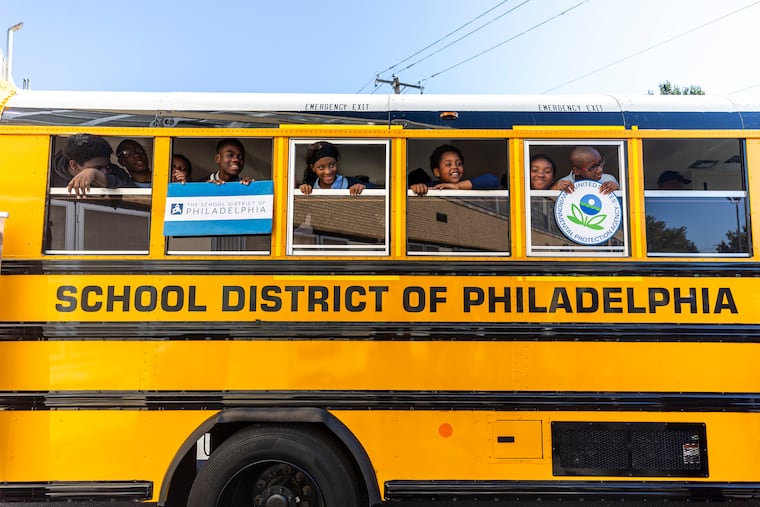Philly schools are getting $17 million for a fleet of new electric school buses
The grants — part of $5 billion in federal money to bus new electric buses across the country — are paying for 45 new electric buses for the Philadelphia School District.

Philadelphia is more than doubling its fleet of electric school buses, thanks to $17 million from the U.S. Department of Environmental Protection.
The grants — part of $5 billion in federal money to buy new electric buses across the country — are paying for 45 new electric buses for the Philadelphia School District.
Philadelphia rolled out its first electric school buses in the 2021-22 school year; the district currently has 20 electric and 38 propane buses.
The vast majority of the district’s 300 buses are still powered by diesel fuel; the 45 new buses will bring the percentage of buses that run on clean fuel to 34%. (Most of the 21,000 children transported by the district ride buses owned not by the district but by contractors.)
According to Climate Central, a nonprofit that researches climate change, 90% of the nation’s 480,000 school buses run on diesel, which deteriorates air quality and contributes to air pollution. There were 12,174 electric school buses across the country as of June — a 19-fold increase over the last five years.
The money for new electric buses in Philadelphia is a step toward reducing emissions and improving air quality, crucial in a city where one in five children suffers from asthma, said Adam Ortiz, the EPA’s Mid-Atlantic regional administrator. (Nationwide, 1 in 15 kids has asthma.)
“The buses are a big deal,” Ortiz said at a news conference Wednesday at Lamberton Elementary in West Philadelphia.
Superintendent Tony B. Watlington Sr., a former school bus driver himself, climbed aboard an electric bus driven to Lamberton for the news conference.
The bus he drove in a North Carolina district “was not environmentally friendly,” Watlington said. Electric buses are “quieter, they’re more environmentally friendly.”
In Philadelphia, the superintendent said, “We continue to strive to be a sustainable school district.”
U.S. Rep. Mary Gay Scanlon (D., Pa.), a former Wallingford-Swarthmore school board member, said she recognized the importance of districts transitioning to electric school buses but also knew how hard it was to stretch school budgets.
“Study after study shows that students need healthy school environments in order to learn and to thrive, and that includes how students get to school,” said Scanlon.